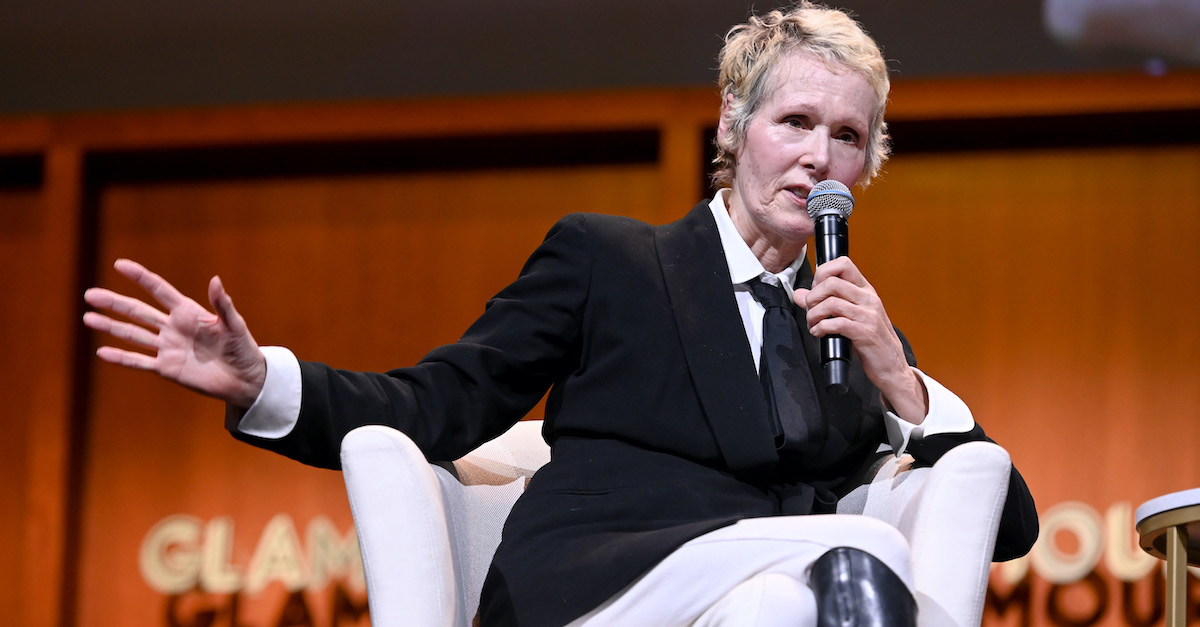
Attorneys for E. Jean Carroll on Friday asked a federal appeals court to reject the Justice Department’s attempt to represent Donald Trump in the famed author and columnist’s lawsuit accusing the former president of defaming her by denying that he raped her in a Bergdorf Goodman dressing room in the 1990s.
Carroll sued Trump for defamation in New York State court after he said she was lying about the assault allegations which were first published in an excerpt from her book in the summer of 2019. After Trump’s attorneys failed to remove the case to federal court, the DOJ stepped in, removing it to federal district court and seeking to substitute the United States as the defendant.
That attempt to substitute Trump with the nation relied upon the premise that the president acted in an official capacity when he said Carroll was “totally lying” about the rape allegations in order to gin up sales of her book — and when he said she was “not my type.”
Shortly before the presidential election, U.S. District Judge Lewis Kaplan rejected the attempt to rebrand Carroll v. Trump as Carroll v. United States of America under the reasoning that Trump’s comments about Carroll’s claims had “no relationship to the official business of the United States.”
The Justice Department appealed by arguing that Trump’s statements were in service of his duties as head of the Executive Branch. Carroll’s attorneys characterized that claim as “both wrong and dangerous” in Carroll’s latest filing before the U.S. Court of Appeals for the Second Circuit.
In a 70-page brief, Carroll’s filing argues that the lower court’s ruling should be affirmed because Trump’s comments were personal in nature and because there was no legal basis to interpret them as falling with the scope of his employment as president.
“This commonsense conclusion follows directly from the evidence before the Court and from longstanding principles of respondeat superior liability,” Carroll’s attorney Robert Kaplan wrote, referring to the legal doctrine that generally holds an employer responsible for the acts of its employees. (Robert Kaplan has no relation to Judge Lewis Kaplan.) “On appeal, DOJ and Trump offer no basis to disturb that finding. Indeed, there is almost nothing in their briefs that discusses the facts at all. Instead, they urge the Court to adopt a new rule that would create categorical immunity for any federal official who defames anyone while speaking to the press or responding to perceived critics. That rule is both wrong and dangerous, and this Court should reject Appellants’ effort to avoid answering for Trump’s conduct.”
According to Kaplan, granting the DOJ’s request would create a categorical immunity for elected federal officials, allowing them to avoid accountability for all of their public statements regardless of the relevant facts and circumstances.
“That theory is indefensible,” Kaplan wrote. “It finds no support in precedent — if anything, it implies that the detailed, fact-sensitive analysis in many prior cases was a needless exercise. And it reflects a disturbing belief that federal officials should have free rein to destroy the reputations and livelihoods of any perceived critic — no matter how unrelated to the business of governance, and no matter how personal their motives for doing so. That has never been — and never should be — the law in the United States.”
Carroll said she remained optimistic that the New York-based federal appeals court would affirm Judge Kaplan’s ruling in her favor.
“Trump has tried and failed repeatedly to get my lawsuit booted. Last fall, he had his Justice Department intervene and try to get it dismissed in federal court. He lost. Then, just a week before President Biden’s inauguration, Trump’s private lawyers and the DOJ joined forces to argue on appeal that when Trump called me a liar who was too ugly to rape, he was somehow being presidential,” she said in a statement emailed to Law&Crime. “This is offensive to me. It is offensive to sexual assault survivors everywhere. I hope that it is offensive to the Justice Department under President Biden. I am confident that the Second Circuit will make it clear that no president, including Donald Trump, can get away scot free with maliciously defaming a woman he sexually assaulted.”
Read the full brief below.
E. Jean Carroll Brief by Law&Crime on Scribd
[image via Ilya S. Savenok/Getty Images for Glamour]